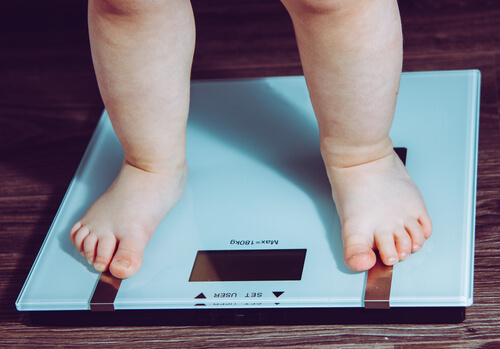Consequences of a Bad Diet in Children


Written and verified by the nutritionist Saúl Sánchez Arias
The consequences of a bad diet in children include serious illnesses with permanent and devastating results.
A balanced diet is part of a healthy lifestyle and reduces the risk of many conditions later in life.
Prevention not cure: avoiding the consequences of a bad diet in children
The consensus among doctors is that prevention is better than cure. Eating a balanced diet covering all food groups during childhood can provide lifelong protection against certain conditions.
Meanwhile, bad habits picked up from parents during early infancy can stay with us throughout our lives.
If children refuse to eat fruit, vegetables or fish, parents should look for other ways to get these nutrients into their diet.
Following a healthy, balanced and varied diet during our early years of life shapes our metabolism as adults.
Slow development, poor concentration and fatigue are just some of the consequences of a bad diet in children. For example, children who aren’t getting the right nutrients often have more trouble reading or studying.
Malnourished children often have issues with their skin and hair. Vision problems and delayed mental and physical development are frequent consequences of nutrient deficits, along with frequent bouts of illness.
Weight gain and weight loss
Whether children eat too much or too little, malnutrition has serious consequences throughout the body.
One of the consequences is dramatic weight gain or weight loss. Other effects often seen later in life include high blood pressure, osteoporosis, kidney disease and heart disease.
High cholesterol and certain types of cancer are also more likely to appear in individuals with a bad diet.

Iron deficiency
Iron deficiency is a nutritional deficit that can lead to anemia. The effects on children’s intellectual development are irreversible. It limits the capacity for analysis and understanding and stunts intelligence.
Muscle weakness
Muscle weakness or myasthenia is another one of the consequences of a bad diet in children. Children with this condition may be lethargic and pale, stop growing early and cry frequently.
Low physical performance and poor grades at school are other risks. Babies with low muscle tone are usually late to begin walking.
“A lack of parental supervision over what children eat is one of the causes of a bad diet in children.”
Childhood obesity
Rapid weight gain in children makes it more difficult for kids to move and play. It can also trigger hormonal disorders, diabetes, high cholesterol, bone disorders, respiratory complications and liver disease.
A lack of parental supervision over what children eat is one of the causes of a bad diet in children.
When kids indulge in packaged, preprepared meals, processed meat, fatty fast food, soda, sweets and fried treats, the consequences are quick to appear.
An excess of carbohydrates, protein or fat in a child’s diet can also cause problems for their health. Finding the right balance is crucial.
Protein: excess or deficiency
Protein is indispensable for the growth of muscle fibers. However, in excess, protein can overload the kidneys and liver, which are responsible for eliminating toxins from the body.
Excess calcium can build up when the body is having difficulty eliminating waste. This leads to painful kidney stones. Too much calcium can also reduce the intake of other minerals from our diet.
Meanwhile, a lack of protein can cause other problems, such as exhaustion, muscle atrophy, fatigue, weakness and lethargy.
Carbohydrates: too much or too little
During childhood, an excessive intake of carbohydrates can cause diabetes and heart disease in addition to obesity. Too much sugar also causes cavities, mood swings, difficulty concentrating and hyperactivity.
At the other extreme, children who don’t get enough carbohydrates may feel tired and lethargic. Carbs are fuel for our bodies: the right amount gives us the energy we need.

Dietary fat: the right amount and type
A diet with excess fat can lead to weight gain. A lack of essential fats, however, can cause deficits of vitamin A, D, E and K, irritability, lack of concentration and lethargy.
Vitamin deficiencies also lead to thyroid problems, fatigue, anemia, scurvy and rickets. Parents should pay attention to symptoms such as fatigue, cramps, headaches, mood disorders and a reduction in mental capacity.
The consequences of a bad diet in children can be permanent. A varied and balanced diet early on is key to a long and healthy life.
Although getting children to eat nutrient-rich foods from different groups can be a struggle, it’s indispensable to their future development.
All cited sources were thoroughly reviewed by our team to ensure their quality, reliability, currency, and validity. The bibliography of this article was considered reliable and of academic or scientific accuracy.
- Asociación Colombiana de Dermatología y Cirugía Dermatológica. Desnutrición. Cambios en la piel.
- Calder P. C, Jackson A. A. Undernutrition infection and immune function. Nutritional Research Reviews. Junio 2000. 13 (1): 3-29.
- Chen G. How diet and nutrition impact a child’s learning ability. Public Schools Review. Mayo 2022.
- Fondo de las Naciones Unidas para la Infancia (UNICEF). Children, food and nutrition: growing well in a changing world. Octubre 2019.
- Fondo de las Naciones Unidas para la Infancia (UNICEF). Estado Mundial de la Infancia 2019. Niños, alimentación y nutrición. Crecer bien en un mundo en transformación. 2019.
- Gómez Santos F. Desnutrición. Boletín Médico del Hospital Infantil de México. Septiembre-Octubre 2016. 73 (5): 297-301.
- Government of Alberta. Healthy eating in children: problems caused by poor nutrition. Diciembre 2020.
- Holick M. F. The vitamin D deficiency pandemic: approaches for diagnosis, treatment and prevention. Review in Endocrine & Metabolic Disorders. Junio 2017. 18 (2): 153-165.
- Mayo Clinic. Obesidad Infantil. Noviembre 2022.
- Scherbaum V, Srour M. L. The role of breastfeeding in the prevention of childhood malnutrition. World Review of Nutrition and Dietetics. 2016. 115: 82-97.
- Seravalle G., Grassi G., Obesity and hypertension. Pharmacol Res, 2017. 122: 1-7.
- Switcowski K. M, Gingras V et al. Patterns of complementary feeding behaviors predict diet quality in early childhood. Nutrients. Marzo 2020. 12 (3): 810.
- World Health Organization (WHO). Anaemia.
- World Health Organization (WHO). Malnutrition. Junio 2021.
- World Health Organization (WHO). Enfermedades no transmisibles. Septiembre 2022.
- Wu G., Dietary protein intake and human health. Food Funct, 2016. 7 (3): 1251-65.
- Zavaleta N, Astete-Robilliard L. Efecto de la anemia en el desarrollo infantil: efectos a largo plazo. Revista Peruana de Medicina Experimental y Salud Pública. Noviembre-Diciembre 2017. 34 (4).
This text is provided for informational purposes only and does not replace consultation with a professional. If in doubt, consult your specialist.
